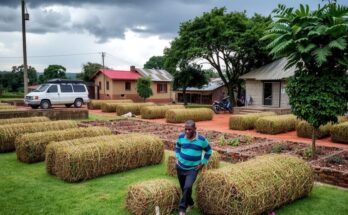Cholera outbreaks in Sudan and Nigeria have escalated death rates to nearly three times the global average, putting thousands of children at risk. Severe flooding and conflict are complicating treatment efforts, with Sudan reporting a CFR of 3.1 and Nigeria 2.9%. Over 4.4 million people have been affected by flooding in West and Central Africa. Save the Children highlights the urgent need for healthcare intervention as children are disproportionately impacted by these preventable diseases.
ABUJA/KHARTOUM, 4 October 2024 – The recent cholera outbreaks in Sudan and Nigeria have reached alarming death rates, reported to be up to three times above the global average. Thousands of children are at grave risk as the situations in these countries continue to deteriorate due to ongoing conflict and severe flooding, which impede access to necessary medical treatment, according to Save the Children. In Sudan, the Case Fatality Rate (CFR) currently stands at 3.1 deaths per 100 confirmed cholera cases, significantly exceeding the minimum standard of 1% (1 death per 100 confirmed cases). Nigeria is similarly affected, reporting a cholera fatality rate of 2.9%. Coordinated flooding events, driven by climate change, have impacted approximately 16 countries across West, Central, and East Africa, with UN data indicating that over 4.4 million individuals in West and Central Africa and more than 2 million in Eastern Africa have been affected as of late 2024. The resultant flooding and contaminated water sources have led to a surge in cholera cases, a disease that can be effectively treated. Unfortunately, essential healthcare services have been severely disrupted in parts of Sudan and Nigeria, raising the mortality rates, particularly among children under five years. Statistics from Sudan reveal over 17,600 cholera cases and 546 related deaths between 22 July and 29 September, covering 60 localities across 10 states. An ongoing healthcare crisis, marked by nearly 80% of hospitals rendered inoperable and a lack of fundamental medical supplies, has exacerbated the cholera outbreak, fueled by nearly 18 months of conflict. In Nigeria, cholera outbreaks correlate with significant displacement due to widespread flooding impacting 29 of 36 states, predominantly in the northern region. As of October 1, there were over 450 confirmed cases of cholera in Nigeria, resulting in 32 deaths, and children accounted for 37% of these cases. With continuous rains predicted in northern Nigeria, the situation is expected to escalate further. Mohamed Abdiladif, Interim Country Director for Save the Children in Sudan, stated, “A lack of vital medicines, combined with hunger and malnutrition is putting millions of children at risk of diseases and possible death. Our health teams across the country are telling us that most of the child cholera deaths are from other complications due to weakened immune systems due to malnutrition. For children, the collapsing healthcare system is not only depriving them of emergency medical care, but also disrupting their access to essential routine services, including lifesaving vaccinations for children under five and maternity care for pregnant mothers. Cases of cholera, measles, and dengue fever have risen exponentially in recent months, and now hundreds of people are losing their lives to entirely preventable causes.” In response, Save the Children is undertaking various interventions, from testing water quality in Sudan to distributing medical supplies and cholera kits in Nigeria. In Sudan, initiatives include chlorination at water sources and solid waste disposal. In Nigeria, efforts focus on providing essential supplies to displaced individuals and improving access to clean water. Duncan Harvey, Country Director of Save the Children in Nigeria, emphasized, “Cholera outbreaks are preventable with proper infrastructure and hygiene practices. But the flooding in Nigeria is making life worse for the most vulnerable, especially the children in northeast Nigeria. The situation is putting food and clean water out of reach and malnutrition and disease are already rife among children. We call on governments and donor agencies to speed up actions to save the lives of children. We urge the public to take precautions and seek medical attention immediately if symptoms arise.”
The outbreaks of cholera in Sudan and Nigeria reflect a combination of environmental and societal issues that have created a public health crisis. Worldwide, cholera is largely preventable and treatable when appropriate healthcare access is available. However, the confluence of flooding caused by climate change and ongoing conflict has resulted in a significant loss of healthcare infrastructure, making it exceedingly difficult to manage and contain such outbreaks. Areas that are experiencing severe flooding are also facing challenges related to water contamination, exacerbating the spread of cholera and other waterborne diseases, especially among vulnerable populations such as children.
The cholera crises in Sudan and Nigeria serve as alarming reminders of the dire consequences resulting from climate variability and social instability. The surge in cholera cases and the associated high fatality rates highlight the urgent need for improved healthcare access and humanitarian intervention in these regions. As stated by Save the Children, without immediate action and support from governments and humanitarian organizations, the suffering of children and families is set to worsen, underscoring the imperative for both local and international actors to prioritize health infrastructure and disaster response mechanisms.
Original Source: reliefweb.int




